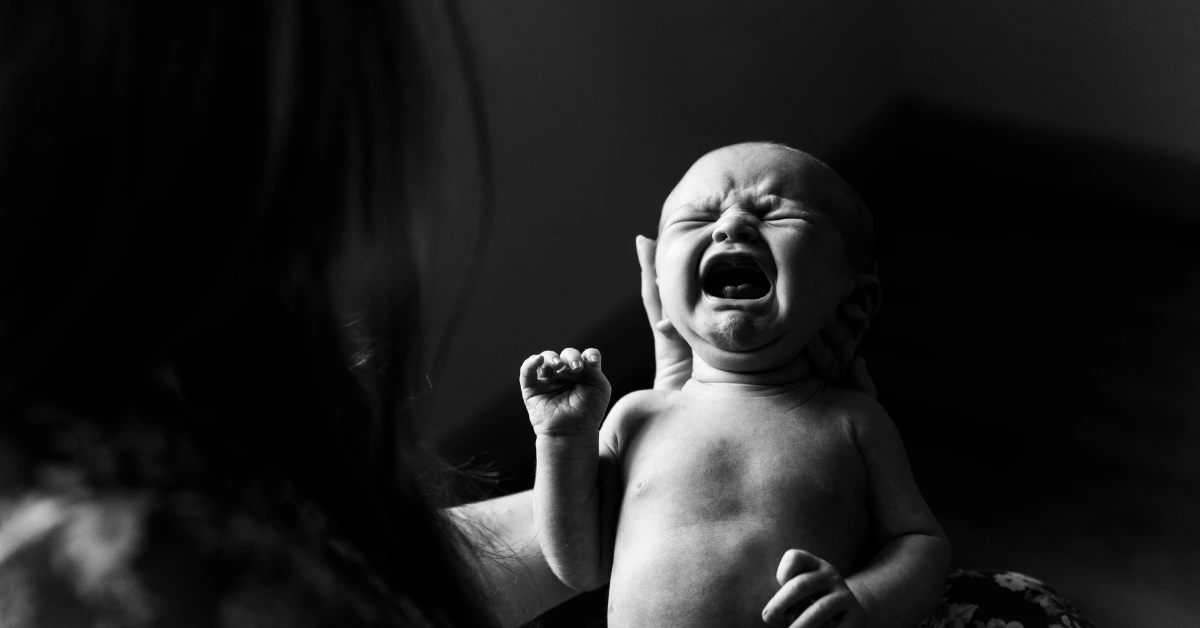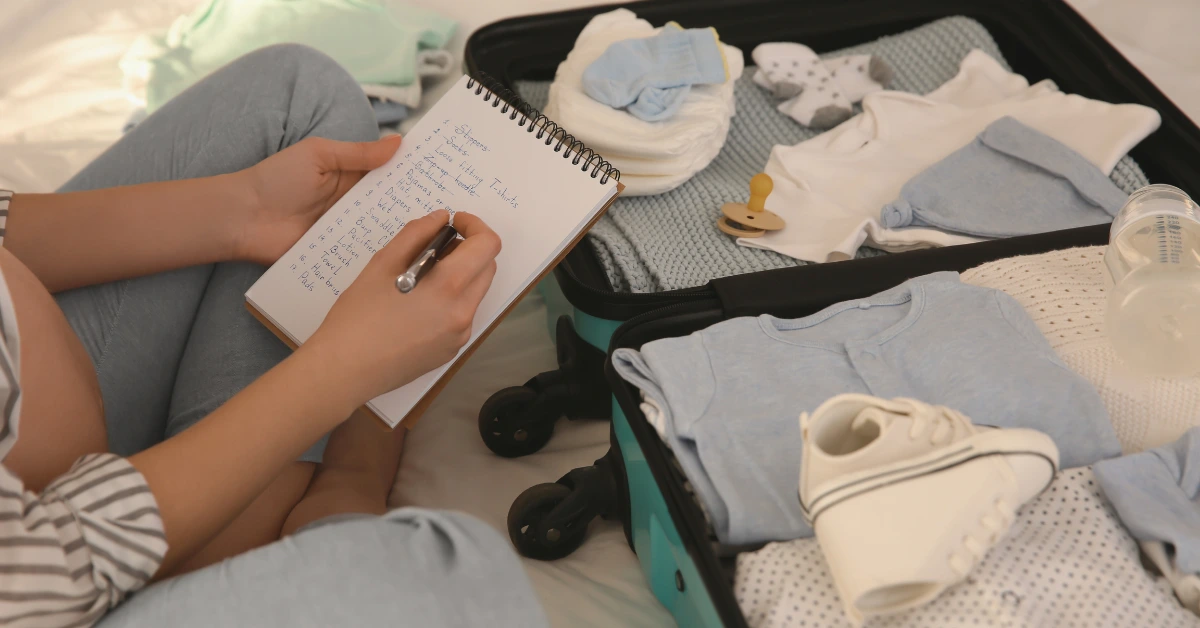Baby Won’t Stop Crying and You’re Too Tired to Cope

When your baby won’t stop crying, your brain stops working. I remember one night when my baby had been crying for what felt like forever. I had tried bouncing, feeding, burping, walking, patting, and sitting in the dark. Nothing worked. I started wondering if this was just how it was going to be.
So, if your baby won’t stop crying and you’re beyond tired and starting to wonder if it’s something you’re doing wrong, I’ve been there. It’s not that you’re dramatic or doing a bad job. You’re just exhausted, and your baby’s lungs work a little too well, and you need something that actually makes a difference.
This isn’t some perfect step-by-step solution. It’s what I tried when nothing else was working, and I needed a way to get through the day without falling apart.
Why Is My Baby Crying?
I know, I know. You’ve probably already gone through the mental checklist. But let’s start there anyway, just to feel a little more in control.
- Hunger – Babies don’t always stick to a schedule. Even after a full feed, they might act hungry again soon after, especially during growth spurts or when they need extra comfort.
- Dirty diaper – Some don’t mind sitting in it. Others will cry the second it’s wet. Even a damp diaper can trigger nonstop fussing until it’s changed.
- Tired – When they’re overtired, they resist sleep like it’s a battle. Fussing, arching, and crying while rubbing their eyes is their version of saying, “I need help falling asleep.”
- Gas – A single trapped bubble can throw everything off. You burp, rock, bicycle their legs, and still nothing. Sometimes it just has to work its way out on its own.
- Overstimulated – Loud sounds, bright lights, or too much action can overwhelm them fast. What starts as wide-eyed curiosity can turn into crying without any warning.
- Undersimulated – If they’re lying in silence or stillness too long, they’ll let you know. Babies need interaction, movement, or even a simple change of scenery.
And sometimes? There is no obvious reason. You could be holding a full, clean, well-rested baby who decides life is terrible anyway. That’s when you start second-guessing everything, including your ability to parent.
Why Is My Baby Crying?
There’s no one-size-fits-all trick here. But I’ll walk you through what I tried that got me through the roughest moments.
Check the Basics Again
Sometimes I’d think he wasn’t hungry because I just fed him, but then he’d latch like he hadn’t eaten in years. So, I started rechecking even the “obvious” stuff:
- Offer a feed again
- Peek inside the diaper
- See if the onesie is too tight or if a tag is itching
Don’t assume you’ve ruled everything out. Babies don’t follow logic. They follow vibes.
Then Try These...
Here are the things that actually gave me a break from the crying, or at least helped me hold it together.
1. White Noise
I figured this out by accident. I was cleaning, and his dad was holding him. He was cranky and clingy, clearly wanting me. But I couldn’t stop. If I didn’t finish, all the dust I’d already stirred up would just hang in the air and settle back down.
Then I turned on the vacuum. While I was vacuuming the floor, he completely knocked out in his dad’s arms. That sound worked like magic. After that, we started using white noise during naps and bedtime. A fan, vacuum, or even static from YouTube might help you more than lullabies.
2. Swaddling
Some of my babies liked it. Some acted like I was wrapping them for battle. If your baby flails or wakes themselves easily, it’s worth trying, but don’t be surprised if they start fighting it overnight, like it’s their new personality.
3. Movement
I did laps around the living room, rocked on my legs with a pillow across them, and bounced gently while singing. Sometimes I switched between the bassinet and the carrier when my arms got tired. Whatever kept me and the baby in motion was worth trying.
4. Pacifier
None of my kids used a pacifier. They were breastfed, and I never introduced one. If you’re considering it, some moms say it helped. Mine preferred me, which was both sweet and completely exhausting.
5. Skin-to-Skin
This calmed both of us. I’d keep them in just a diaper and hold them close to my chest while we sat quietly. It didn’t always stop the crying, but it helped ease the tension in both our bodies. Some days, that was enough.
6. Bath or Clean Up Routine
For newborns, even a quick wipe before bed helped. When they got older, I started giving them a warm bath before nap time or nighttime sleep, especially on days they were extra fussy.
If the crying didn’t make sense, I’d give them a bath, change them into pajamas, feed them, and let the routine settle them. Sometimes they just needed that full reset to calm down.
When Crying Feels Non-Stop
Colic is basically baby code for “we don’t know why they’re screaming, but it’s a lot and it’s loud.”
Signs it might be colic:
- Crying lasts more than 3 hours a day
- Happens more than 3 days a week
- Goes on for more than 3 weeks
- Usually worse in the evening
For Your Sanity
When the crying won’t stop and your brain feels completely drained, you need care too. That part doesn’t get said enough.
Here’s what I did when I was at my limit:
- Sat down next to the bassinet or crib and took a few slow breaths while keeping an eye on the baby. Even thirty seconds to reset helped me not lose it.
- Earbuds. Played something calming in one ear. Sometimes a lullaby, sometimes a playlist that helped me calm down. I honestly don’t even remember hitting play.
- Asked for help. Even if I didn’t want to. Even if it was just someone holding the baby while I ate or went to the bathroom in peace.
You can still need space and love them with everything you’ve got. That doesn’t make you weak. It makes you human.
When to Call the Doctor
This part matters. If something feels off, trust your gut and call the pediatrician. Trust that instinct. Always.
Call if:
- Your baby is under 3 months old and has a fever over 38°C (100.4°F).
- They’re refusing to eat
- They’re not making wet diapers
- Cry sounds weak or high-pitched
- They’re super sleepy and hard to wake
- Doctors would rather you call early than wait too long.
You’re Not Failing
If your baby won’t stop crying, it doesn’t mean you’re doing something wrong. It means your baby is trying to tell you something, the only way they know how. Some days will stretch you thin. Some will make you doubt yourself. But it won’t be like this forever.
You’re not expected to know every answer, but you deserve support while figuring it out.


